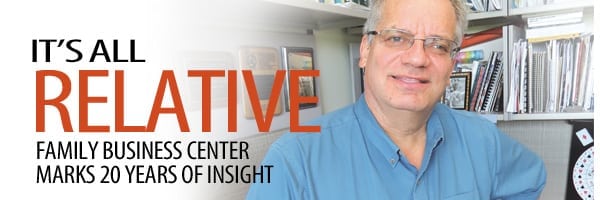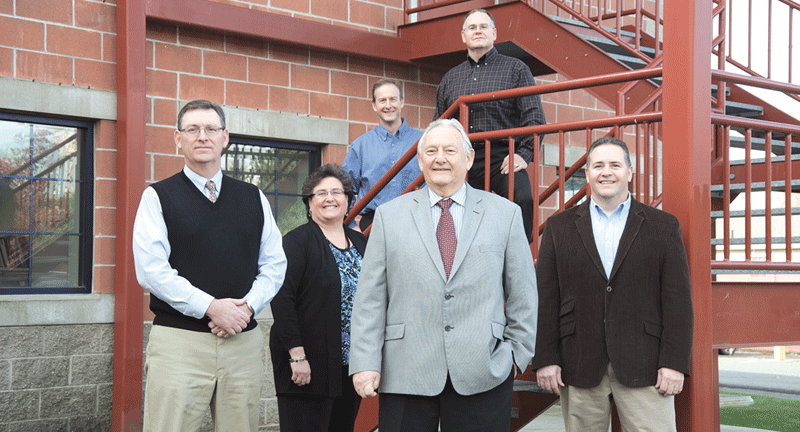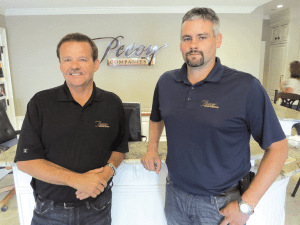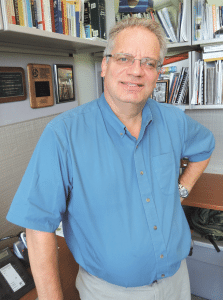
It’s All Relative
Family Business Center Marks 20 Years of Dispensing Insight
There’s a small sign in front of a parking space near the front door of Notch Mechanical Constructors in Chicopee declaring that it is reserved for Roger Neveu, who founded the company 41 years ago.He has rarely parked there in recent years, said his son, Steve, one of five siblings now managing the venture, noting that his father stops by once in a while, but considers himself fully retired. The parking space, he said, is a way to recognize the past and the elder Neveu’s vision and drive, and, in a way, it serves as a symbolic bridge between the generations — a way of saying that, while the company’s creator isn’t physically there most of the time, he still has an important place in the enterprise.
Of course, the process of building an actual bridge between the generations managing a business is much more difficult than creating a designated parking space, and this concept of having a ‘place’ is quite complicated as well. And it was these simple realities that helped drive the creation of what is now known as the UMass Amherst Family Business Center, which this month will celebrate 20 years of helping businesses like Notch achieve successful transitions — and also negotiate countless problems that arise when several people with the same last name are running an operation.
The center’s executive director, the colorful Ira Bryck, said the agency was founded through the inspiration of a number of professionals and business advisers, many of whom still serve as strategic partners, and was also part of a movement in the early and mid-’90s to establish university-based education programs for family businesses.
“It became clear to a lot of expert advisers that they needed a sort of safe-harbor environment to be able to talk with business owners about a lot of issues that they normally would not be able to talk with them about if they were just doing their taxes or helping them with some legal issue,” said Bryck, adding that the center has certainly filled this role effectively over the years.
And this is one of many reasons why, two decades or more after many family business centers were established, the UMass facility is one of a relatively few that are, well, still in business.
Other reasons include Bryck’s persistence and imagination when it comes to creating value for members, and his ability to enable the center to evolve over the years and broaden its scope. For example, the center is no longer exclusively for family businesses — it also assists closely held operations — and has extended its main focus to all that it takes for a business to succeed in a changing and challenging climate.
It does so mostly through the many dinner meetings staged annually, during which speakers with a wide range of backgrounds provide insight on the myriad issues facing businesses today, and attendees are given some thoughts — and inspiration — on how to take these lessons back to their plants and offices and implement them.

Roger Neveu, who founded Notch Mechanical Constructors and later was bought out by five of his siblings, sought out the UMass Amherst Family Business Center for help on succession issues.
And it’s a unique marketplace, he went on, because membership crosses virtually all business sectors, from manufacturing to retail to technology, and while these industries have their unique challenges, there are issues and concerns common to all ventures.
“There have been many good conversations where people have gained a broader perspective because they’re talking to people who are not in their industry,” he explained. “Everyone would like to think that they can think outside the box, but what’s really helpful is to talk to someone who’s not in your box.”
Kent Pecoy, founder and owner of West Springfield-based Kent Pecoy Homes, and a long-time member, agreed. He told BusinessWest that he enjoys the diverse nature of the membership and the perspective provided by business owners facing similar issues.
Pecoy said he’s probably years away from dealing with succession issues at the company, but there are still plenty of matters for which he can use that aforementioned safe harbor, many of them involving his son, Jason, who has worked at the company since he was in high school and has been going to work with his father for as long as he can remember.
“Working with my son all the time is a blessing, but it’s not without its challenges,” he said with a laugh.
For this issue, BusinessWest pauses at the center’s 20th anniversary to discuss with Bryck and others how this organization has made an important difference within the local business community.
Public Relations
By now, most in this region know about Bryck’s background, and specifically the many years he spent working beside his parents at the children’s clothing outlet called Barasch’s Kids Store on Long Island.

Kent Pecoy, a long-time member of the Family Business Center, says working with his son, Jason, is a blessing, but is “not without its challenges.”
These include the writing of three plays — A Tough Nut to Crack, based on his time at Barasch’s, as well as The Perils of Pauline’s Family Business and Wait Till Your Father Gets Home — which are still performed on occasion.
But while Bryck became proficient as a playwright, his greater talents have been selling the center to the region’s business community, connecting members with resources, and implementing change within the agency when necessary to maintain relevance.
Retracing the history of the center, Bryck reiterated that it was part of a national trend to create programs focused on family businesses and the issues facing them. MassMutual was at the forefront of that movement, eventually becoming involved with more than 50 centers, and one of its financial advisers, Charlie Epstein, president of Epstein Financial Services, was instrumental in getting the center off the ground.
Epstein’s company remains a strategic partner, along with First Niagara Bank, Giombetti Associates, the law firm Bulkley Richardson, the accounting firm Meyers Brothers Kalicka, and Touchstone Advisors. These partners provide financial and advisory support, as well as input on the center’s mission and the process of carrying it out, said Bryck.
Ross Giombetti, a principal with Hampden-based Giombetti Associates, which provides employee assessment, leadership training, recruitment, and other services, has been a strategic partner from the beginning. He said the center has been successful in fulfilling the safe-harbor role, and in providing a unique forum in which business owners can learn from each other and, in the process, often avoid costly missteps.
“We needed a forum where family business leaders — siblings, husbands, and wives — felt comfortable talking about their issues and the dynamics of operating their business,” he explained, “and also where they could learn from other successful family businesses and professionals, do things better, and perhaps avoid some of the mistakes they made.”
The center hosts six dinner forums each year as well as several workshops and roundtable discussions focused on strategic questions, said Bryck, adding that this year the schedule will include a 20th-anniversary party on Oct. 14 at the Log Cabin Banquet & Meeting House.
There will be much to celebrate at that event, said Bryck, adding that the center remains vibrant, with more than 60 member businesses, including several that have been involved from the beginning, and it continues to evolve and expand its role.
In fact, there was talk a few years ago of changing the name to the UMass Family and Closely Held Business Center, said Bryck, adding that a consensus emerged that the family business was still an effective niche, and the main point of emphasis. However, a new slogan — “a continuing resource for family and closely held businesses” — was adopted to drive home the broader mission, which has come about out of necessity in many ways, he said.
Elaborating, Bryck told BusinessWest that many operations that were family businesses — concerns run by multiple generations or several members of the same generation — are now sole proprietorships or concerns with one owner, with managers who still need the type of support and services the center has provided.
“There were a lot of family businesses that became non-family businesses,” he explained, adding that he’s not sure how national or global this phenomenon is, but does know it’s a pattern regionally. “There are still a lot of multi-generational families in business, but around here, parents retired or passed away, the kids took over … and sometimes the siblings or cousins in business realized that it wasn’t the same and they didn’t get along that well since the parents left. So a lot of family businesses went back to sole owner.
“So we said, ‘are all of these people who are suddenly sole owners or have brought in partners who are not family no longer our concern?’” he went on, adding that all those quickly determined that he answer to that question was ‘no.’ “There were many people who were still interested in what we do, so we started focusing more on the issues of small and medium-sized businesses in Western Mass. and what they needed to succeed.”
Mostly, what they need is insight into coping with the many challenges of doing business today, Bryck noted, adding that members get this through both the speakers he brings to the dinner forums and the other members in the room.
“A business owner or key manager who comes to the meetings gets as much out of the program from discussing issues with other business owners in the room as they might get from the presenter,” he explained, adding that, while speakers will devote most of their time to dissecting an issue, they will leave some for interactive discussion about how attendees can apply what they’ve learned to their operation.
“We’re working more and more on how companies are actually going to implement what they’ve learned, because someone could come in with a grand theory of some kind, and a very practical owner of a small or medium-sized company is going to say, ‘I could use this or that piece of it,’” said Bryck, adding that he’s considering an additional set of roundtable programs or follow-up workshops devoted to the process of implementation.
Not Child’s Play
Notch Mechanical Constructors had been a member for several years, and is now ‘member emeritus,’ a more limited type of membership, said Steve Neveu, who serves as president, adding that the center has played a significant role in what he described as a smooth transition in ownership from his father to the five siblings that take titles ranging from vice president to ‘crew leader.’
“It’s a nice division of labor,” he told BusinessWest, adding that all five worked in their business while their father was running it and they get along, two attributes that certainly help in the challenging environment that is the family business.
“We’re a close family,” he noted. “Like any set of partners, you don’t always see eye to eye on things, but we manage to work things out cleanly and get to the bottom of issues.”
Neveu doesn’t remember the specific circumstances that led to Notch joining the center — whether Bryck reached out to his father or vice versa, or whether a consultant recommended joining — but he can clearly recall a number of occasions when the agency, through its various programs, provided valuable insight to the family, not only about succession, but on a host of other issues as well.
“This was about the time when my father was starting to consider how to pass this on to the next generation and how to do that well,” he recalled. “I had been talking with him about it — I was his president, and he was CEO — and we thought joining the Family Business Center made sense on many levels.
“I have an MBA, but one of things you find is that they don’t talk about these kinds of issues in school,” he went on. “The center offered a unique forum, a way to learn about this whole process. We were a well-functioning family business at the time, but it’s different when you have one owner.”
Neveu said the center, through the speakers at its dinner forums, focused on issues both broad and specific, and in many cases, the subject matter involved something not covered in a textbook or in business school — such as the issue of whether to make siblings not involved in the family business shareholders.
“A lot of companies do that, but I remember a speaker at one of the dinner meetings saying that such a scenario is fraught with difficulty,” he recalled. “When a parent has two children in the business and two outside the business and gives them all equal shares, you can create a division there because there will be different perspectives, and you open up an area for complications when you do that.
“I remember meeting with my father and taking about it, and we decided it made sense to keep the business with those in the business,” he went on. “It was an understanding of what’s healthy, and example of how you really need to think things through when you make important decisions like that.”
Another matter the center has been helpful with is something Neveu called the “hat concept.” Elaborating, he said the owners of a family business like Notch will wear many hats representing their various roles — as employees, board members, and shareholders — and it’s important to remember to keep them straight.
“People need to know which hat they’re wearing and understand the authority and responsibility that goes with each hat,” he explained.
Neveu said speakers at the center’s meetings rarely provide direct advice, but they will explain the parameters of a specific issue and, thereby, help members make smart decisions.
Pecoy agreed, and told BusinessWest that, unlike most other business groups he belongs to or serves as a board member, such as a homebuilders association, the Family Business Center has members across a host of industries, all facing similar issues and challenges in an ever-more-competitive global economy. This mix, and the interactive dialogue it creates, has helped nurture a unique learning environment, one that provides attendees with both perspective and insight.
“This is more widespread and diverse,” he said of the center, “and you get to see how similar all businesses are. It doesn’t make any difference whether you’re in manufacturing or construction — it’s amazing how similar the issues are, and this has been a great takeaway from our involvement.
“And our employees get an entirely different take on things,” he continued, adding that several will attend the center’s dinner meetings over the course of a year. “They begin to see how difficult it is for a business owner and the many challenges he or she faces. It’s a great forum for them to listen to other business owners, which is important, because they see it on some level within my organization, but when you hear other business people in different organizations talk about the same thing, it solidifies it or brings more credibility.”
The Bottom Line
While Pecoy, 56, jokes that it might be 20 years or more before he gets around to transitioning his business to the next generation, he admits that he thinks about succession all the time, primarily because it is one of the main focal points for many of the center’s speakers over the years.
“One of the best lines I’ve heard goes something like, ‘when the owner of the business walks out, no one even hears the door close,’” he told BusinessWest, adding that this colorful wording refers to a completely seamless transition.
These rarely happen in business, but because of the Family Business Center and its informative programming, that complicated matter — and countless others — have become easier for dozens of businesses to negotiate.
George O’Brien can be reached at [email protected]






